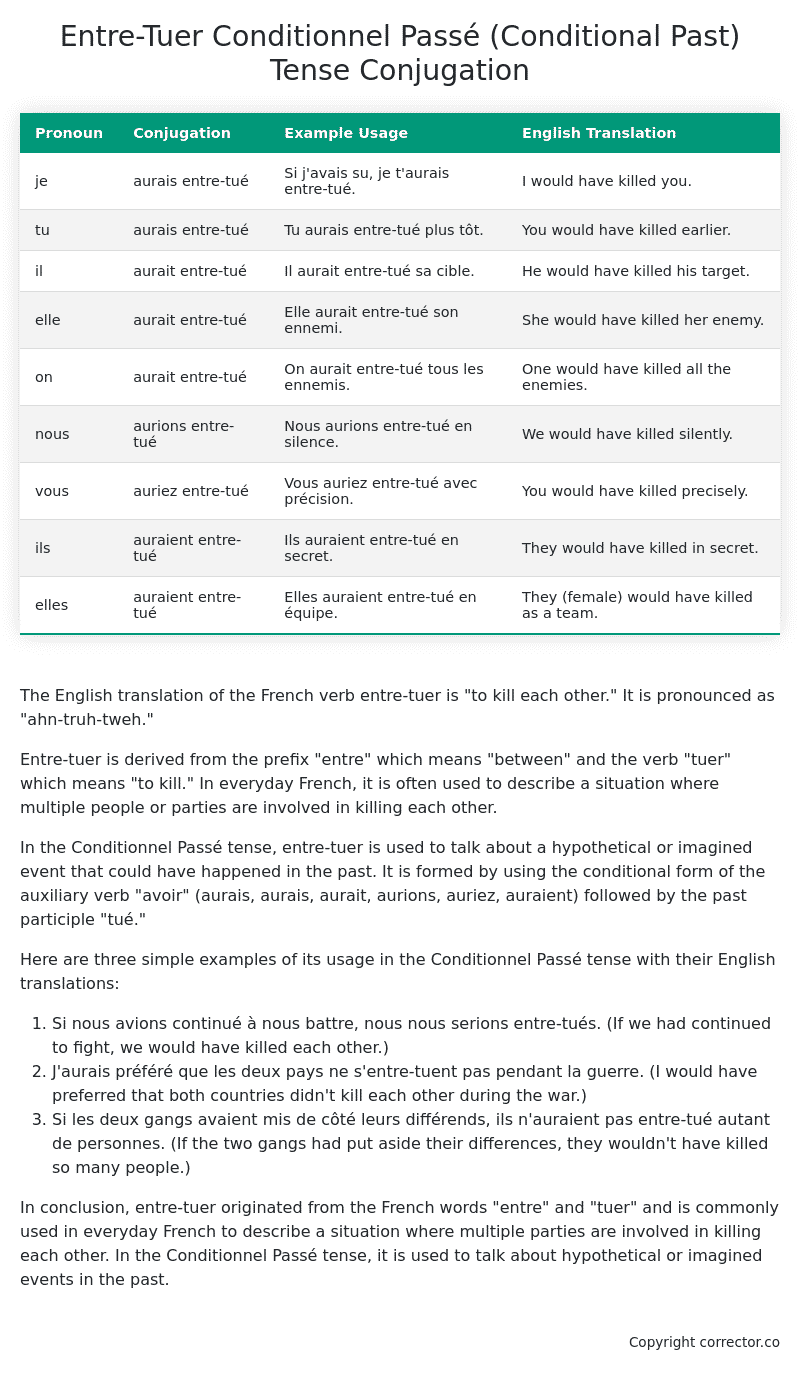Conditionnel Passé (Conditional Past) Tense Conjugation of the French Verb entre-tuer
Introduction to the verb entre-tuer
The English translation of the French verb entre-tuer is “to kill each other.” It is pronounced as “ahn-truh-tweh.”
Entre-tuer is derived from the prefix “entre” which means “between” and the verb “tuer” which means “to kill.” In everyday French, it is often used to describe a situation where multiple people or parties are involved in killing each other.
In the Conditionnel Passé tense, entre-tuer is used to talk about a hypothetical or imagined event that could have happened in the past. It is formed by using the conditional form of the auxiliary verb “avoir” (aurais, aurais, aurait, aurions, auriez, auraient) followed by the past participle “tué.”
Here are three simple examples of its usage in the Conditionnel Passé tense with their English translations:
- Si nous avions continué à nous battre, nous nous serions entre-tués. (If we had continued to fight, we would have killed each other.)
- J’aurais préféré que les deux pays ne s’entre-tuent pas pendant la guerre. (I would have preferred that both countries didn’t kill each other during the war.)
- Si les deux gangs avaient mis de côté leurs différends, ils n’auraient pas entre-tué autant de personnes. (If the two gangs had put aside their differences, they wouldn’t have killed so many people.)
In conclusion, entre-tuer originated from the French words “entre” and “tuer” and is commonly used in everyday French to describe a situation where multiple parties are involved in killing each other. In the Conditionnel Passé tense, it is used to talk about hypothetical or imagined events in the past.
Table of the Conditionnel Passé (Conditional Past) Tense Conjugation of entre-tuer
| Pronoun | Conjugation | Example Usage | English Translation |
|---|---|---|---|
| je | aurais entre-tué | Si j’avais su, je t’aurais entre-tué. | I would have killed you. |
| tu | aurais entre-tué | Tu aurais entre-tué plus tôt. | You would have killed earlier. |
| il | aurait entre-tué | Il aurait entre-tué sa cible. | He would have killed his target. |
| elle | aurait entre-tué | Elle aurait entre-tué son ennemi. | She would have killed her enemy. |
| on | aurait entre-tué | On aurait entre-tué tous les ennemis. | One would have killed all the enemies. |
| nous | aurions entre-tué | Nous aurions entre-tué en silence. | We would have killed silently. |
| vous | auriez entre-tué | Vous auriez entre-tué avec précision. | You would have killed precisely. |
| ils | auraient entre-tué | Ils auraient entre-tué en secret. | They would have killed in secret. |
| elles | auraient entre-tué | Elles auraient entre-tué en équipe. | They (female) would have killed as a team. |
Other Conjugations for Entre-Tuer.
Le Present (Present Tense) Conjugation of the French Verb entre-tuer
Imparfait (Imperfect) Tense Conjugation of the French Verb entre-tuer
Passé Simple (Simple Past) Tense Conjugation of the French Verb entre-tuer
Passé Composé (Present Perfect) Tense Conjugation of the French Verb entre-tuer
Futur Simple (Simple Future) Tense Conjugation of the French Verb entre-tuer
Futur Proche (Near Future) Tense Conjugation of the French Verb entre-tuer
Plus-que-parfait (Pluperfect) Tense Conjugation of the French Verb entre-tuer
Passé Antérieur (Past Anterior) Tense Conjugation of the French Verb entre-tuer
Futur Antérieur (Future Anterior) Tense Conjugation of the French Verb entre-tuer
Subjonctif Présent (Subjunctive Present) Tense Conjugation of the French Verb entre-tuer
Subjonctif Passé (Subjunctive Past) Tense Conjugation of the French Verb entre-tuer
Subjonctif Imparfait (Subjunctive Imperfect) Tense Conjugation of the French Verb entre-tuer
Subjonctif Plus-que-parfait (Subjunctive Pluperfect) Tense Conjugation of the French Verb entre-tuer
Conditionnel Présent (Conditional Present) Tense Conjugation of the French Verb entre-tuer
Conditionnel Passé (Conditional Past) Tense Conjugation of the French Verb entre-tuer (this article)
L’impératif Présent (Imperative Present) Tense Conjugation of the French Verb entre-tuer
L’infinitif Présent (Infinitive Present) Tense Conjugation of the French Verb entre-tuer
Struggling with French verbs or the language in general? Why not use our free French Grammar Checker – no registration required!
Get a FREE Download Study Sheet of this Conjugation 🔥
Simply right click the image below, click “save image” and get your free reference for the entre-tuer Conditionnel Passé tense conjugation!

Entre-Tuer – About the French Conditionnel Passé (Conditional Past) Tense
Formation
Common Everyday Usage Patterns
Expressing Unreal Past Scenarios
Polite Requests or Suggestions
Expressing Doubt or Uncertainty
Interactions with Other Tenses
Conditional Present
Indicative Past Tenses
Conditional Future
Summary
Want More?
I hope you enjoyed this article on the verb entre-tuer. Still in a learning mood? Check out another TOTALLY random French verb conjugation!


